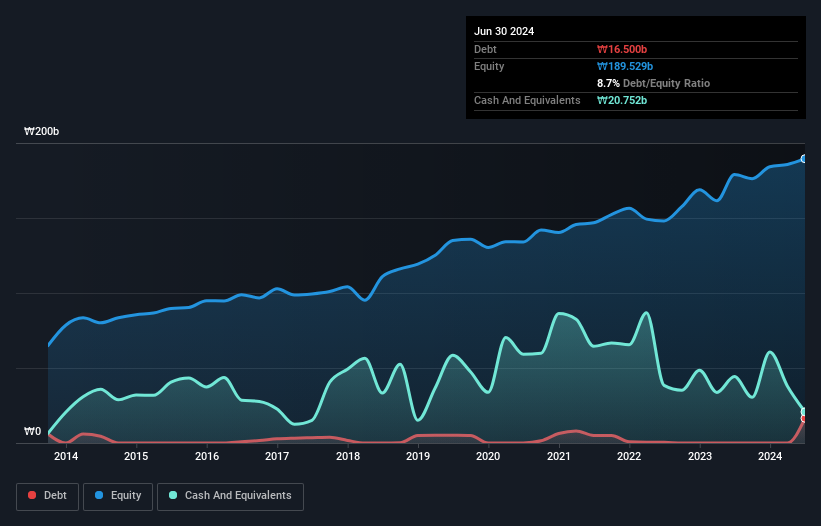- South Korea
- /
- Semiconductors
- /
- KOSDAQ:A083930
Avaco (KOSDAQ:083930) Takes On Some Risk With Its Use Of Debt
The external fund manager backed by Berkshire Hathaway's Charlie Munger, Li Lu, makes no bones about it when he says 'The biggest investment risk is not the volatility of prices, but whether you will suffer a permanent loss of capital.' It's only natural to consider a company's balance sheet when you examine how risky it is, since debt is often involved when a business collapses. We can see that Avaco Co., Ltd. (KOSDAQ:083930) does use debt in its business. But is this debt a concern to shareholders?
When Is Debt Dangerous?
Debt is a tool to help businesses grow, but if a business is incapable of paying off its lenders, then it exists at their mercy. In the worst case scenario, a company can go bankrupt if it cannot pay its creditors. While that is not too common, we often do see indebted companies permanently diluting shareholders because lenders force them to raise capital at a distressed price. Of course, debt can be an important tool in businesses, particularly capital heavy businesses. The first thing to do when considering how much debt a business uses is to look at its cash and debt together.
Check out our latest analysis for Avaco
How Much Debt Does Avaco Carry?
As you can see below, at the end of June 2024, Avaco had ₩16.5b of debt, up from none a year ago. Click the image for more detail. But on the other hand it also has ₩20.8b in cash, leading to a ₩4.25b net cash position.

How Strong Is Avaco's Balance Sheet?
The latest balance sheet data shows that Avaco had liabilities of ₩170.0b due within a year, and liabilities of ₩5.47b falling due after that. Offsetting this, it had ₩20.8b in cash and ₩53.0b in receivables that were due within 12 months. So its liabilities total ₩101.7b more than the combination of its cash and short-term receivables.
While this might seem like a lot, it is not so bad since Avaco has a market capitalization of ₩189.1b, and so it could probably strengthen its balance sheet by raising capital if it needed to. But it's clear that we should definitely closely examine whether it can manage its debt without dilution. Despite its noteworthy liabilities, Avaco boasts net cash, so it's fair to say it does not have a heavy debt load!
But the bad news is that Avaco has seen its EBIT plunge 15% in the last twelve months. If that rate of decline in earnings continues, the company could find itself in a tight spot. There's no doubt that we learn most about debt from the balance sheet. But it is future earnings, more than anything, that will determine Avaco's ability to maintain a healthy balance sheet going forward. So if you want to see what the professionals think, you might find this free report on analyst profit forecasts to be interesting.
Finally, a business needs free cash flow to pay off debt; accounting profits just don't cut it. While Avaco has net cash on its balance sheet, it's still worth taking a look at its ability to convert earnings before interest and tax (EBIT) to free cash flow, to help us understand how quickly it is building (or eroding) that cash balance. During the last three years, Avaco burned a lot of cash. While investors are no doubt expecting a reversal of that situation in due course, it clearly does mean its use of debt is more risky.
Summing Up
While Avaco does have more liabilities than liquid assets, it also has net cash of ₩4.25b. Despite its cash we think that Avaco seems to struggle to convert EBIT to free cash flow, so we are wary of the stock. When analysing debt levels, the balance sheet is the obvious place to start. However, not all investment risk resides within the balance sheet - far from it. To that end, you should learn about the 2 warning signs we've spotted with Avaco (including 1 which shouldn't be ignored) .
If, after all that, you're more interested in a fast growing company with a rock-solid balance sheet, then check out our list of net cash growth stocks without delay.
New: Manage All Your Stock Portfolios in One Place
We've created the ultimate portfolio companion for stock investors, and it's free.
• Connect an unlimited number of Portfolios and see your total in one currency
• Be alerted to new Warning Signs or Risks via email or mobile
• Track the Fair Value of your stocks
Have feedback on this article? Concerned about the content? Get in touch with us directly. Alternatively, email editorial-team (at) simplywallst.com.
This article by Simply Wall St is general in nature. We provide commentary based on historical data and analyst forecasts only using an unbiased methodology and our articles are not intended to be financial advice. It does not constitute a recommendation to buy or sell any stock, and does not take account of your objectives, or your financial situation. We aim to bring you long-term focused analysis driven by fundamental data. Note that our analysis may not factor in the latest price-sensitive company announcements or qualitative material. Simply Wall St has no position in any stocks mentioned.
About KOSDAQ:A083930
Avaco
Provides equipment for flat panel display, semiconductor, solar, and thin film industries in South Korea.
Undervalued with solid track record.
Market Insights
Community Narratives


Recently Updated Narratives


Fiducian: Compliance Clouds or Value Opportunity?


Q3 Outlook modestly optimistic


Alphabet: The Under-appreciated Compounder Hiding in Plain Sight
Popular Narratives


The company that turned a verb into a global necessity and basically runs the modern internet, digital ads, smartphones, maps, and AI.


MicroVision will explode future revenue by 380.37% with a vision towards success



